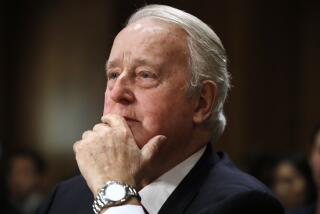Right-Winger Chosen as Ontario Conservative Leader
- Share via
TORONTO — Ontario’s Progressive Conservative Party, one of the most powerful, successful and efficient political machines in North America, on Saturday selected right-winger Frank Miller as its new leader and the next premier of the province.
Miller, the current provincial minister of industry, won on the third ballot of the party’s convention, defeating Finance Minister Larry Grossman, 869 to 792. He will replace outgoing Premier William G. Davis, the Progressive Conservative leader in Ontario for the last 10 years.
The final vote, which pitted the moderate Grossman against the hard-line conservative Miller, came after almost 10 hours of demonstrations, lots of deal-cutting and two ballots.
In the earlier voting, two other contenders, Dennis Timbrell and Roy McMurtry, were eliminated, although Timbrell protested his defeat after the second ballot and demanded a time-consuming recount that, in the end, gave the same result.
Under convention rules, the candidate finishing last on any ballot is eliminated and balloting continues until one contender holds a majority of the 1,682 delegates. Because there were four candidates at the outset, there could have been no more than three ballots, but the contention over the second ballot, compounded by slow counting procedures, set back the schedule several hours.
Under Canada’s parliamentary system, the leader of the dominant party automatically becomes premier after a brief transition period. Miller’s ascent will extend the Tories’ 42-year hold on Canada’s richest and most powerful province until the next election, probably later this year.
Pre-convention polls indicated that the Tories would be heavy favorites in the next general election no matter who was leader.
The 57-year-old Miller’s victory on the third ballot had been expected. However, Grossman’s showing was a surprise to most observers, who had picked Timbrell as the strongest challenger.
Miller led from the start, but was faced with an “anybody but Miller” effort by the other contenders.
Grossman made up ground by playing up his reputation as a moderate who would rejuvenate the party and overcome a tendency toward complacency after more than four decades of such unending electoral success that the Progressive Conservatives are known as the “natural governing party.”
Until the convention, the leadership campaign was dull, but media attention was still intense.
This reflected a fascination for the Ontario Tories, known as “the big blue machine” because of their traditional success, unity and stability, which have kept leadership switches to an average of one every 10 years.
The interest also reflects the power of both the Ontario Tories and the province generally in Canada, a power that in this country exceeds even that in the United States of such important states as California or New York.
There are only 10 Canadian provinces, and the nation’s political system gives them much greater power than American states have in terms of financial control and in national and constitutional matters.
And since Ontario is the most populous and richest of the provinces--it has one-third of the nation’s 25 million-plus people--political control of Ontario automatically makes the province and its controlling party among the most important factors in the country.
More to Read
Sign up for Essential California
The most important California stories and recommendations in your inbox every morning.
You may occasionally receive promotional content from the Los Angeles Times.










